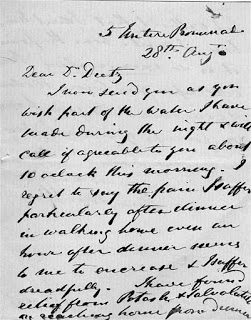
Here is a short note from the Conservative politician and former soldier Sir Henry Edwards (1812- 86) to his physician, which was found among some autographed letters.
5, (street name illegible)
28th Aug.
Dear Dr Deetz
I now send you as you wish part of the water I have made during the night & will call if agreeable to you about 10 o’clock this morning. I regret to say the pain I suffer, particularly after dinner, in walking home, even an hour after dinner, seems to me to increase & I suffer dreadfully. I have found relief from Potash & (illegible) on reaching home from dinner, but without that I don’t know how I could bear the pain—it is so excruciating. I will call on you before 10 o’clock, if convenient, at your house, or perhaps you would prefer to see me here.
Yours mostly truly, Henry Edwards
Deetz Esq, MD.
As a former soldier, Edwards was doubtless used to speaking plainly and indeed suffering pain, but to those familiar with examples of Victorian decorum on such matters, this short letter to his doctor may surprise us today. Did he pee into an old jam jar or beer bottle and ask his servant to deliver it to the physician along with the explanatory note? Perhaps his servant was used to such unusual errands and didn’t turn a hair. Obviously, we don’t know what was wrong with Edwards, but if he had suffered from similar symptoms before and suspected kidney stones, a confirmation from his doctor that stones were present in his urine would explain the errand and proposed visit. As someone who has suffered four separate bouts of kidney stones over a eight year period, I can personally testify to the agony they cause. However, the fact that the pain came on after dinner would suggest gallstones to me.
Edwards’ use of Potash for relief is interesting. Potash was the common name for potassium carbonate in Victorian times, but according to Robert Hooper’s The Physician’s Vade-Mecum (1823), potassium tartrate was the specific for gallstones. [R.M.Healey]
